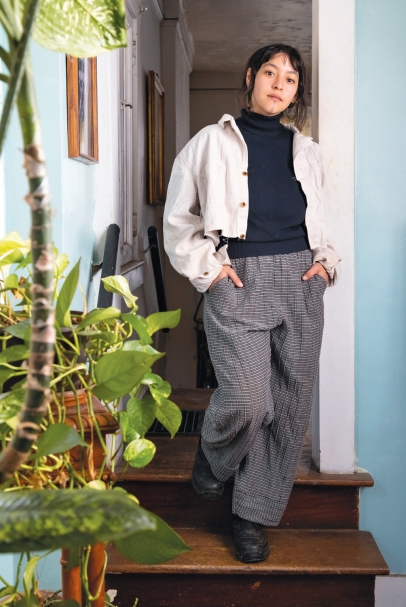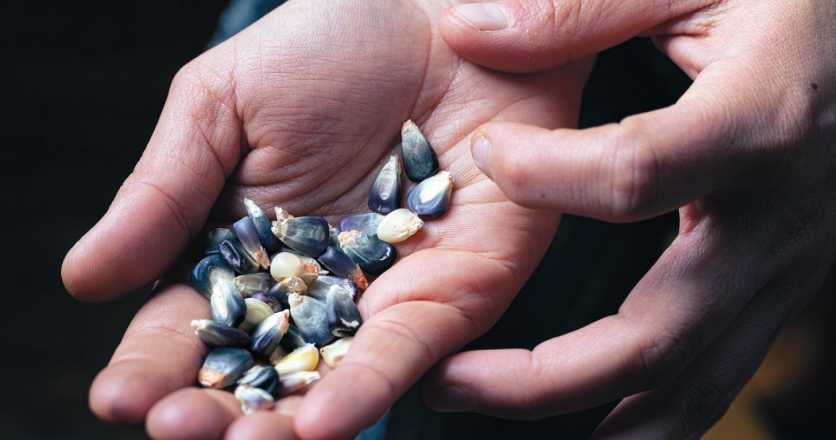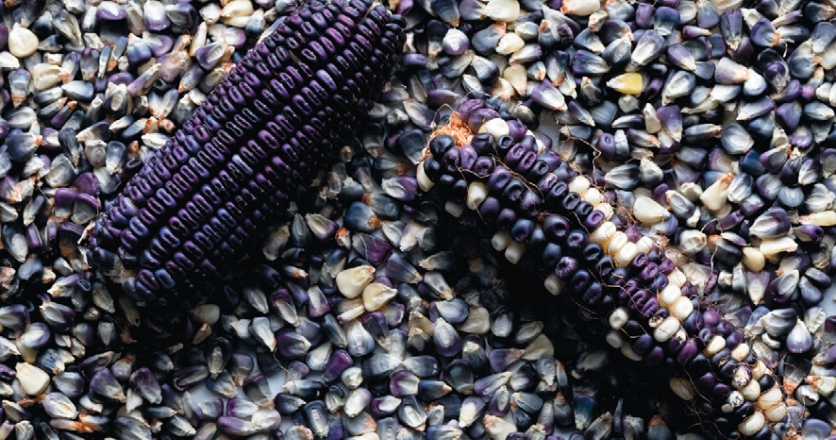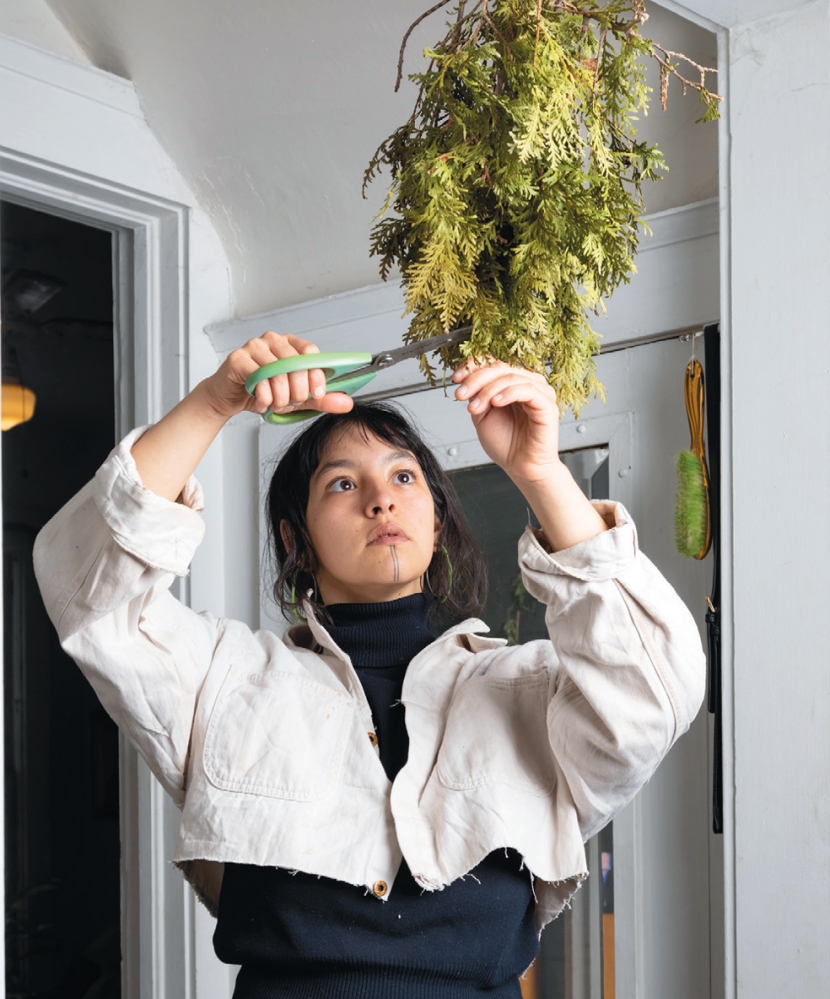Feeding Community
Long before the last snow melts, Kirsten Kirby-Shoote is making plans for her garden. During the quiet of winter and early spring, she takes out the seed inventory that she’s gathered from relatives, friends and fellow growers and thinks about what she will plant.
“It almost comes together like a puzzle,” she says. “I have to visualize it for it to be transposed onto the land. Seeing how the bits and pieces fit together. Where certain plants will want to be. I meditate on the stories behind the seeds before the rush of spring planting comes.”
Kirby-Shoote is a member of the Tlingit Nation and a passionate Indigenous food activist and urban gardener who is working to preserve and promote awareness of Native foods. Saving and sharing seeds that have been passed down for generations and creating an access point for traditional and culturally relevant foods for the local urban community is a dream she is bringing to life.
Although not often recognized, Detroit is situated on the ancestral homelands of the Ojibwe, Ottawa, Potawatomi and Wyandot tribes, and the history of the Indigenous community and the foods that they harvested runs deep in the region. Kirby-Shoote and other Indigenous activists in Michigan want people to understand that this story is not merely part of Detroit’s past, but it is also an important part of its present and future.
Noting that Indigenous corn was grown in the region long before the Treaty of Detroit in 1807 moved Native tribes off of the land, she believes that Indigenous people planting, stewarding and harvesting their traditional foods brings that story forward.
Originally from the West Coast, Kirby-Shoote left Oregon four years ago in search of meaning after the loss of her father. She followed an opportunity to work on an organic farm in Detroit, never expecting to find a strong connection with the local community.
“I think it was a time of movement in my life. My father had passed away and I was very emotion-centered. Grief gets stuck into your thought process. I need to physically move my body. Once I got here it was a huge shift in my perception—not only in my perception of the environment, but my perception of myself. I think it reflected the resilience I had seen in my community, that the people here had an amazing ability to not only survive, but also be beautiful in their own right. It was very special. I hadn’t seen that before,” she says.
Not long after arriving, she began dreaming about creating a garden centered around Indigenous food and plants. She started a small garden just outside of Pontiac, which she called Leilu Gardens, which means butterfly in her culture.
“I chose this name because the butterfly speaks to the transformation. More specifically, the personal and community transformative power of tending gardens.”
She moved to a larger garden space in Highland Park last year and recently purchased property for a permanent garden space in Detroit’s Arden Park neighborhood, which she envisions as an edible landscape with a greenhouse and gathering space with an outdoor kitchen for educational events and community meals, and eventually plans to offer community-supported agriculture (CSA) shares to her community. A recent grant award through Why Hunger will enable her to build the needed infrastructure.
While she awaits the time of planting, she has begun bringing in raspberry canes, strawberry plants and other perennials from her previous garden. She is drying tobacco leaves and shaking the tiny seeds free from their flower heads. She is processing dried corn into flour for traditional foods such as cornbread and tortillas, and she selects the seeds from her inventory that will be planted this year, such as sunchoke, elderberry, Robin’s Egg corn and speckled tepary beans.
“Indigenous seeds are different from commercially grown seeds,” she says. “There is such a narrative that seeds hold, outside of big agriculture. It’s really about where you are. The story of a seed gets deeper and deeper, and the seeds you come in contact with start their own stories in a way.
“The garden will include the foods of Black and Indigenous People of Color,” she explains, “which will also allow the cultural foods of our Black relatives to be grown, like collards, okra, hot peppers and wormwood. Once we get the garden going, we’ll invite people to watch it grow up with us. That will be really special. I love to host dinners for our neighbors and the people I interact with on a daily basis.”
As for education, she plans to bring various Indigenous voices and perspectives into the mix to teach classes and host events, such as Shiloh Maples of the Native American Food Sovereignty Alliance and Rosebud Bear Schneider of Ziibimijwang Farm for the Little Traverse Bay Bands of Odawa Indians.
“I’m not the only voice,” she says. “Visibility is a privilege in a lot of ways. Bringing out the Indigenous community through knowledge sharing makes it a more cohesive community.”
Kirby-Shoote believes that this work can help to heal ancestral trauma that Indigenous people have experienced from the loss of their Native lands.
“It’s healing in a way that connects us with our ancestors, but also connects us to our children’s children. It’s something far-reaching. If you look up to the stars, it’s hard to see a beginning or an end. It’s a panoramic view of ourselves, which is increasingly important, given the state of our climate, our foods and health systems. We need to go back to the original agreement with the land, water and plants—that we would take care of each other. Some of those agreements have been broken. Our job is to repair the trauma that occurred, as the healing needs to take place,” she says.
“I was raised with rows and rows of cornfields, with nothing but huge swatches of barren land that’s been depleted of life. You become desensitized to it pretty quickly from an early age. It’s important to realize this is not how it’s supposed to be. What has come before us will be there after us. We need to take a moment to consider the long haul.”
She hopes to see the urban agriculture community get behind Indigenous people to better provide an equitable food system that will honor the land and honor the people.
“I encourage people to support Indigenous people’s work that is ongoing and to really take a look at the history of the land you are occupying and the tribes that were on the land—and that still are. I hope to bring awareness of our traditions through visibility. A field of Indigenous corn is a statement, saying that these customs are still alive, the people are still here.”
Follow Kirby-Shoote on Instagram.com/leilugardens.
I-COLLECTIVE
I-Collective is an autonomous group of Indigenous farmers, chefs, seed keepers, artists and activists who focus their work on food sovereignty, food education and access. The I-Collective stands for four principles: Indigenous, inspired, innovative and independent. Members strive to open a dialogue and create a new narrative that not only highlights historical Indigenous contributions, but also promotes the community’s resilience and innovations in gastronomy, agriculture, the arts and society at large.
They have just launched a cookbook, community journal and webinar series, A Gathering Basket, to strengthen the connection of Indigenous people to their food. Indigenous food sovereignty is critical because many health issues are tied to colonialism and the exploitation of resources, land and people. Food is the most intimate connection to ourselves, our ancestors, our communities and, most importantly, our future generations. I-Collective’s vision is to increase visibility, own their foods and culture and promote Indigenous ingredients and histories in our modern world.
Learn more at icollectiveinc.org. Subscribe to the series at issuu.com/icollective/docs/a_gathering_basket_recipe_1 Donate to support the series at gofundme.com/f/agatheringbasket
WAYS TO SUPPORT THE INDIGENOUS COMMUNITY
Purchase locally grown food and handmade crafts from Indigenous producers.
Grow plants that are native to the area where you live. This strengthens the ecosystems and supports sustainable farming practices.
Donate to Indigenous organizations like I-Collective, which creates more of an impact for Indigenous people.
Support causes that protect Native lands and heritage. For example, protecting the Great Lakes from water pollution helps protect Indigenous wild rice plantations.








